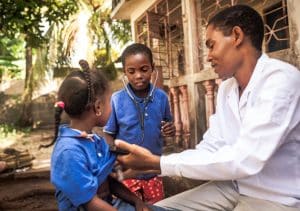Revolutionizing Healthcare: The Impact of Hayat TeleHealth in Somalia

Hayat TeleHealth is pioneering a transformative approach to healthcare in Somalia, driven by a vision where quality medical services are a fundamental right for all Somalis. With a focus on innovation and efficacy, their mission extends beyond telehealth services to eradicating health disparities and achieving universal health coverage in Somalia.
“The inspiration for Hayat TeleHealth comes from our desire to make a significant, positive impact on the healthcare system in Somalia,” says founder Abdul Razaq Abdulahi Ahmed, “using telehealth to overcome the barriers of physical distance and insufficient local healthcare resources, thereby improving the health and well-being of the Somali people. Somalia’s healthcare system…faces significant challenges due to decades of conflict, natural disasters, and economic hardship. These issues have severely impacted healthcare infrastructure and limited access to essential medical services. While international efforts have primarily focused on primary healthcare needs, the availability of specialized medical care remains alarmingly scarce.”
Responding to these needs and the critical shortage of medical specialists in the country, Hayat TeleHealth launched a pilot project from November 2022 to April 2023 connecting Somali patients with international specialists. The program received an overwhelming 160 to 240 daily inquiries, which indicated significant demand for the project. “Initial underestimation of demand led to overwhelmed staff and the need for quick scalability solutions,” says Ahmed. “Mid-pilot, we realized the need for a dedicated team member [for] chronic illness care, which was more in demand than anticipated.”
Key objectives for the pilot program included providing reliable specialist consultations, optimizing operational frameworks, and assessing market reception. “We explored establishing relations with small to medium sized clinics and hospitals in cities/districts that find [it] hard to attract and retain doctors, “says Ahmed.” We collaborated with Baxeer Hospital in Burco, Somaliland, providing 15 patient referrals in the last month of the pilot. We engaged with them to extend the range of services to residents of Burco and lay the groundwork for future cooperation.”
Some of the biggest challenges that emerged from the pilot program were the high shipping costs for prescription medicine, the inability to get certain medicines in the country that are prescribed by the doctors, and the general distrust of medicine by the Somali people.
“The pilot project of Hayat Telehealth has laid a strong foundation for a transformative healthcare service in Somalia. The promising demand, coupled with valuable learnings, set a clear path for
future growth and continued impact on the health and well-being of the Somali community.”
Looking ahead, the top priorities for Hayat Telehealth are securing additional funding, enhancing technology, and broadening service reach. The ultimate goal is to integrate high-quality healthcare into Somalia’s infrastructure, ensuring equal access for all Somalis. “With the budget we are requesting, we will have the capacity to serve 6900 people for a year,” says Ahmed. “The program will be open to everyone in Somalia that responds to our outreach campaigns.”
